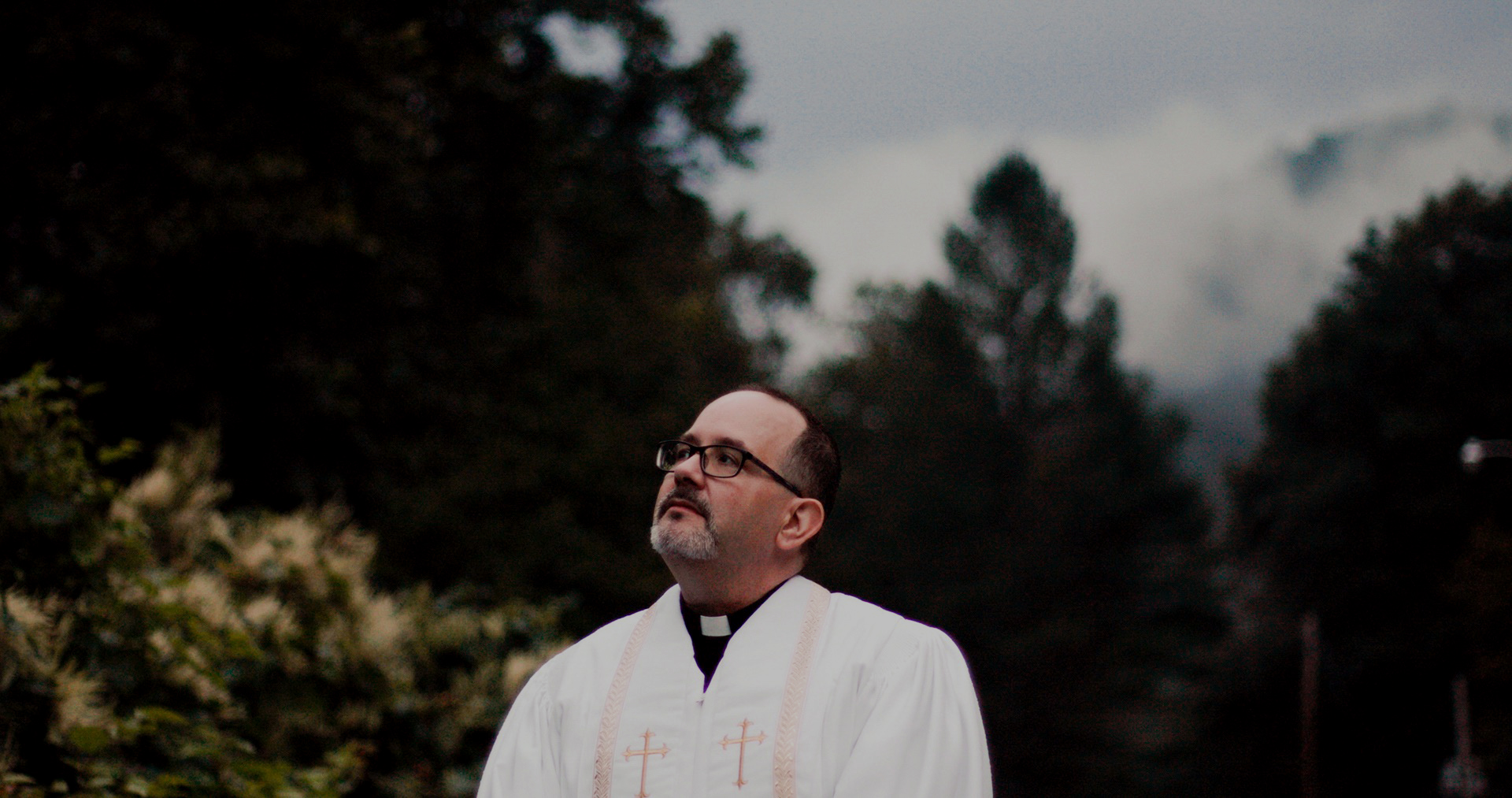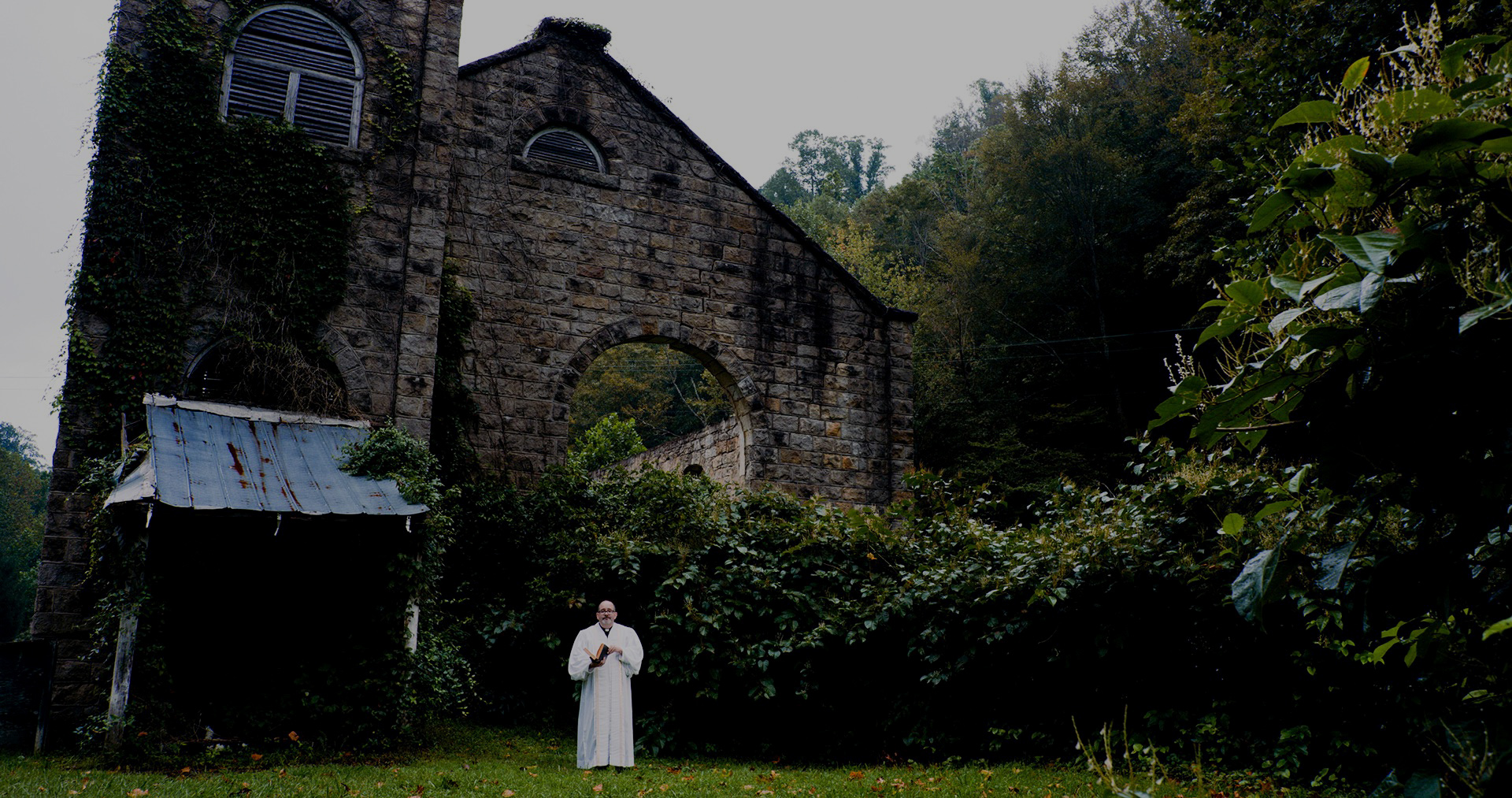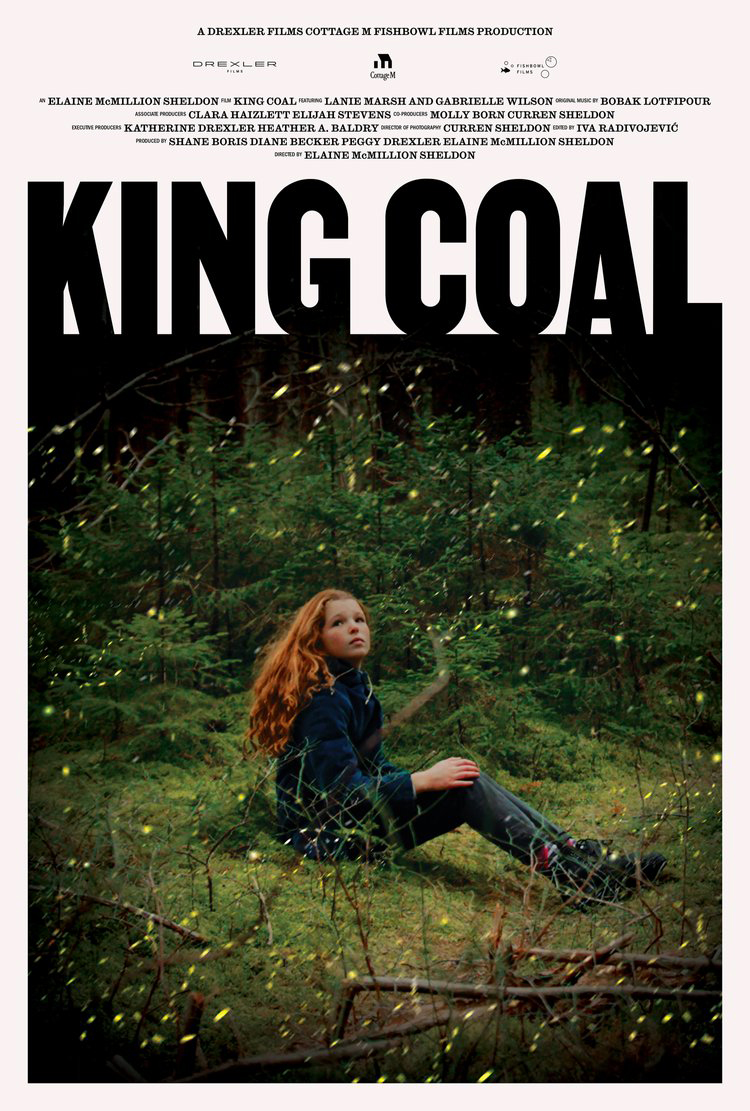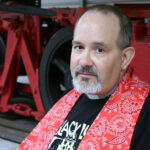
A Eulogy for King Coal
In Appalachia, the relationship to coal is changing. An Oscar-nominated filmmaker and a Methodist preacher have created a eulogy for King Coal—a rite that reminds us how difficult, but necessary it is to say goodbye.
EDITOR’S NOTE: The film, the photographs, and the words you’re about to experience come from the making of a film unlike any I’ve ever seen—King Coal, a new documentary by the Oscar-nominated West Virginia filmmaker Elaine McMillion Sheldon.
Elaine descends from a long line of miners. “I don’t remember,” she says in the film’s narration, “the day I learned that I lived under King Coal.” King Coal is her elegy for this dying industry—and for the marks it left on the people and culture of Appalachia.
King Coal shares little with what we expect from documentaries. Unlike traditional documentaries, the film does not dwell on facts and figures. Instead, it dives into the psyche and myths of Appalachian coal-country culture.
“It blends fictional and fable storytelling elements to tell a different story of coal,” Elaine says.
Two girls who grew up in mining families—Lanie Marsh of Hurricane, West Virginia, and Gabby Wilson of Charleston—pull the narrative of the film from start to finish. We do see them in unscripted real-life activities, such as working together on school projects about the history of coal. But in other scenes, their expressive dancing and curiosity advance the story as sometimes only children can do.
Co-producer Molly Born told me this summer the crew often called this blending of fact and fiction “documentary magical realism.” And truly, a sense of magic pervades the film—its cinematography, its narration, even its sound design. It concludes fittingly with a funeral service for King Coal. For that funeral service, Elaine asked the Rev. Brad Davis, a Methodist minister, to write and deliver a eulogy for the King. The eulogy ultimately did not appear in the final cut of Elaine’s film, but she believed it was worth a short film of its own, and earlier this year, she called to see if Salvation South might want to run that film. That’s what you’re about to experience, with an opening essay from Molly.
—Chuck Reece

Death Does Not Have the Last Word
By Molly Born
The bell tolls as the fog settles in the mountains. Vines thicken around what remains of the old stone church. Had he lived a century ago, the Rev. Brad Davis might have preached at this very place, back when the community was thriving, home to thousands of residents, businesses, playgrounds, a movie theater.
The coal camp, within the community of Ethel, in southern West Virginia, sat atop some of the most profitable coal seams in the United States and played a role in the Battle of Blair of Mountain, America’s largest labor uprising, led by striking miners in 1921. Today, the church is missing its roof, the interior is a mess of brush and debris. But the frame still stands. Here, for an audience of nature alone, Davis delivers a eulogy for King Coal, the personification of a dying industry.
A Methodist pastor, Davis is among the faces in King Coal, a documentary directed by Elaine McMillion Sheldon, and which I co-produced, about coal mining and the places and people it has shaped. McMillion Sheldon asked Davis to write a eulogy during filming in 2021. An informal dictum among clergy, he says, is that the best sermons are the ones you preach to yourself. Growing up here, he’d been writing a form of it in his mind for years. Davis’s reflections guided us during the making of the film, but we knew they deserved their own forum. His work is being published here for the first time: the full, footnoted text of his sermon and in a new short film, directed and edited by McMillion Sheldon.
I first met Davis in 2018, when I was working as a reporter in his hometown of Williamson, West Virginia. A former journalist himself, Davis was in his mid-forties when he enrolled in divinity school. He went on to become the rare kind of cleric here, an activist preacher unafraid to speak pointedly about the effect of extractive industries on the land and its people.
It’s a part of his pastoral work. Through faith, he believes individuals and society at large can be healed from the effects of the “structural and systemic sin” inflicted on Appalachia since the old stone church was in its heyday. It’s also personal. His grandfather and great-grandfather both died of black lung.
If a eulogy is meant to celebrate a life, the praise here is for the “greatest resource”—not coal, but us: “May this be the day of new beginnings for a people and place thought long ago to have arrived at their end.”
“King Coal robbed him of his life,” Davis once wrote of his grandfather, “and me of a life with him.”
What makes a good eulogy, Davis says, is the courage to name the grief, and in the midst of that pain, find a space for hope. Part homage, part homily, he includes references ranging from scripture to the singer-songwriter Sturgill Simpson—and West Virginia’s state motto as a grace note. If a eulogy is meant to celebrate a life, the praise here is for the “greatest resource”—not coal, but us: “May this be the day of new beginnings for a people and place thought long ago to have arrived at their end.”
In August 2022 our film team brought together people from across our state and region—activists, artists, teachers, healthcare workers, coal miners, and coal miners’ children—for a funeral that would serve as both a scene in the movie and a farewell to King Coal. Even with the cameras rolling the funeral was a real service, with hymns, personal testimonies, Davis’s eulogy, and a casket. We asked our guests to wear black and consider it a solemn occasion.
Meditating on the importance of rituals, and taking in Davis’s words, has led me to reconsider a moment from my father’s funeral, in 2018. At a military cemetery in West Virginia, on one of the hottest days that year, the visiting U.S. Navy officer looked into the searching eyes of the sailor holding the other end of the American flag. Sweat streaming down his face, the officer realized his mistake, unfurled what he’d started, and began the thirteen folds all over again. Afterward, the young man approached us, apologizing as he wept. Even as I reassured him, his naked emotion became the most memorable part of the event. In this ceremony, each fold is precise, each has a meaning. I’d always assumed the officer cried out of shame, but now I wonder if it was because the ritual had been broken.
Rituals—from sitting shiva to observing periods of mourning to reciting a Marian prayer—help us to find meaning in grief. Davis’s eulogy speaks to the kind of loss that Appalachians know deeply, because they're living with it. I asked him about reciting it in that particular place, outside the old stone church. His coalfield ancestors felt present to him that day.
“The folks who had been given the company gospel, in the ruins of that company church that I was standing in front of,” Davis says, “they were now experiencing, as all of us are, the beginnings of the reclamation of our story.”
A Eulogy for king coal
By the Rev. Brad Davis
Send not to know for whom the bell tolls; it
tolls for thee, our king of kings.1
But make no mistake dear friends, the bell
surely does not toll for we, the people of this
antique land that stand as monuments, not in
sand, but forged by the hand of this mighty
man that now lay before us.2
Our great master, he who created worlds,
whom we thought—whom we hoped—to be
immortal, now prepares to take the final
mantrip ride down the hole he first prepared
for us all those many generations ago.
The hole where oxygen-rich passion mixed
with combustible pride to ignite new identity’s
fire in our hearts and in our soul.
The hole from which we emerged with a new
generational calling and culture; a sacred space
of being grander than any company church
house.
The hole from which so many of our family,
friends, and neighbors never returned;
identification tags telling the tale.
From the same hole came the power that
made the world turn.
The power that stoked the fires of innovation.
The power to move mountains
and hollow them out.
The power to lift up a people
and lay them low.
Yes, we are a living witness to our great king,
to this his power and his glory—and the
paradox of his being.
Monuments to the imagination,
determination, and sheer grit that breathed
into being an industrial behemoth known as
twentieth century America and forged the
steel that saved the world from tyranny and
despotism.
Old King Coal what are we gonna do?
The mountains are gone, and so are you!3
But even so, rejoice dear ones!
Let not your hearts be troubled, my people.4
Do not despair.
Do not buy into the lie that there is nothing,
that we are nothing, without our king.
He is not the sum total of us and our identity.
There was life here in these hills and hollers
before his coming, and there shall continue to
be life long after he’s laid low in the hole,
joining our crucified ancestors slaughtered as
sacrificial lambs on the altar of greed, power,
and profit.
We shall restore our lost soul that for over a
century has put its misplaced trust in a false
savior—unwilling to see that our salvation
comes not from the strength of an industrial
king, nor from the resources extracted from
under our feet, but from our greatest
resource: us.
Together we shall find a new beginning in our
past—the revolutionary, independent spirit
rooted in community, culture, and above all—
resiliency.
May this be the day of new beginnings for a
people and place thought long ago to have
arrived at their end.
Today, memory’s light breaks where no sun
shines.
Deep in our bones, the old songs are waking
—resurrection notes carrying beloved
community’s harmony, lining out the chorus;
rise and reclaim who the hole taught us to be.
Unlike the seams, our hollowed-out sense of
place is renewable.
Unlike our hills, our sense of being can never
fully be stripped away.
True identity has been covered up for
generations, but today our ancestors’ miracle
prayers no longer go unanswered.
Today the people of the hole emerge from
down there to see the light of this new day up
here.
Today the stone is rolled away.
Today we rebuild the ruins of place.
Today we raise up the ancient foundations of
being.
Today we work together to bring about a new
creation rooted in the old path.
Sisters and brothers, we are repairers of
broken culture, restorers of broken
community.5
Resurrection people.
So take back those flowers, and don’t you sing
no sad songs today children.
Bid your king godspeed for his journey down
the hole of his own making, he who reaps
now what he has wrought, thank him for the
good and curse him for the bad, and shed
those mourning clothes along with your
chains.
We are the drivers of our own destiny now.
We are the originators of our own dreams.
We are the transformers of our own
possibilities.
Send not to know for whom the bell tolls; it
tolls for thee, our king of kings.
But make no mistake dear friends, the bell
surely does not toll for we. Montani Semper
Liberi. Amen.
2 An allusion to the sonnet “Ozymandias,” by Percy Blythe Shelley, 1818
3 From the chorus of the song “Old King Coal,” by Sturgill Simpson, 2013
4 An allusion to the Gospel of John 14:27
5 An allusion to Isaiah 58:12
6 An allusion to a lyric from the song “Black Lung,” by Hazel Dickens, 2006
7 Latin for “Mountaineers Are Always Free,” the West Virginia state motto





